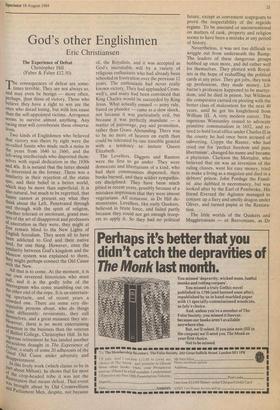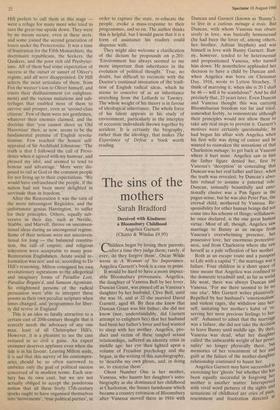God's other Englishmen
Eric Christiansen
The Experience of Defeat Christopher Hill (Faber & Faber £12.50)
The consequences of defeat are some- times terrible. They are not always so, and may even be benign — more often, perhaps, than those of victory. Those who believe they have a right to win are the ones who dread losing, but with less cause than the self-appointed victims. Arrogance seems to survive almost anything. Any racing man will corroborate these observa- tions.
Two kinds of Englishmen who believed that victory was theirs by right were the so-called Saints who made such a noise in the years from 1640 to 1660, and the left-wing intellectuals who disported them- selves with equal dedication in the 1930s and 40s. It is natural that the latter should be interested in the former. There was a similarity in their rejection of the status quo, and their belief in a better world, which may be more than superficial. It is also natural, but much to be regretted, that Saints cannot at present say what they think about the Left. Penetrated through and through with the spirit of religion, Whether tolerant or intolerant, grand mas- ters of the art of disapproval and professors of execration as they were, they might at first remain blind to the New Lights of
been Socialism. They seem all to have land, addicted to God and their native land, for one thing. However, once the sirnilarity between God's kingdom and the f‘inscow system was explained to them, theY might perhaps connect the Old Cause with the New.
All that is to come. At the moment, it is °ur own reverend historicists who must Pull, and it is the godly tribe of the Interregnum who, come stumbling out on the other end of the rope. It is an entertain- ing spectacle, and of recent years a crowded one. There are some very dis- reputable persons about, who do things Pite differently: revisionists, they call i'enaselves, and a great nuisance they are. sniowever, there is no more entertaining showman in the business than the veteran v. Rallied College, Christopher Hill. In his 230rous retirement he has landed another "Ltraculous draught in The Experience of efeat, a study of some 20 adherents of the d.°°d Old Cause under adversity and saPpointment. _In this lively work (which claims to be in 71 about Milton), he shows that for most Re the crop-headed tribe it was not the storation that meant defeat. That event ;as brought about by Old Cromwellians I'd Parliament Men, despite, not because
of, the Royalists, and it was accepted as God's inscrutable will by a variety of religious enthusiasts who had already been schooled in frustration over the previous 12 years. The enthusiasts had never really known victory. They had applauded Crom- well's, and many had been convinced that King Charles would be succeeded by King Jesus. What actually ensued — army rule, based on plunder — came as a slow shock, not because it was particularly evil, but because it was perfectly mundane — a matter of patronage, pay and promotion, rather than Grace Abounding. There was to be no more of heaven on earth than could be tolerated by one irascible general with a tendency to imitate Queen Elizabeth.
The Levellers, Diggers and Ranters were the first to go under. They were democrats and libertarians of a kind, who had their communities dispersed, their books burned, and their soldier sympathis- ers disciplined. They have been much pitied in recent years, possibly because of a mistaken impression that they were almost vegetarians. All nonsense, as Dr Hill de- monstrates. Levellers, like early Quakers, believed in brute force, and failed partly because they could not get enough troop- ers to apply it. So they had no political
future, except as convenient scapegoats to prove the respectability of the regicide regime. To be unsound or unconventional on matters of rank, property and religion seems to have been a mistake at any period of history.
Nevertheless, it vas not too difficult to wriggle out from underneath the Rump. The leaders of these dangerous groups bobbed up once more, and did rather well for themselves. They plotted with Royal- ists in the hope of reshuffling the political cards at any price. They got jobs, they took up professions, they made money. Lil- burne's profession happened to be martyr- dom, and he died in prison, but Wildman the conspirator carried on plotting with the better class of malcontent for the next 40 years, until he got his knighthood from William III. A very modern career. The ingenious Winstanley ceased to advocate primitive communalism in 1652, and re- tired to hold local office under Charles II in the county he had once been accused of subverting. Coppe the Ranter, who had cried out for 'perfect freedom and pure libertinism', changed his name and became a physician. Clarkson the Mortalist, who believed that sin was an invention of the ruling classes, went for easy money, tried to make a living as a magician and died in a debtors' prison. John Pordage the Famil- ist also dabbled in necromancy, but was looked after by the Earl of Pembroke. His friend Everard the Agitator managed to conjure up a fiery and smelly dragon under Oliver, and turned papist at the Restora- tion.
The little worlds of the Quakers and Muggletonians — or Reevonians, as Dr
Hill prefers to call them at this stage were a refuge for many more who tried to turn the great one upside down. They were by no means secure, even in these sects, and some joined the second generation of losers under the Protectorate. It was a time of frustration for the Fifth Monarchists, the doctrinaire republicans, the Seekers, the Quakers, and the poor rich old Presbyter- ians. All of them had some expectation of success at the outset or sunset of Oliver's regime, and all were disappointed. Dr Hill selects the most articulate of them, from Fox the weaver's son to Oliver himself, and traces their disillusionment (or enlighten- ment) and the various mutations and sub- terfuges that enabled most of them to survive and prosper, even as 'second-class citizens'. Few of them were not gentlemen, whatever their enemies claimed, and the doctrine that 'you cannot shoot an Old Harrovian' then, as now, seems to be the fundamental premise of English revolu- tionism. Few reached the honest self- appraisal of Sir Archibald Johnstone: 'The truth is that I followed the call of Provi- dence when it agreed with my humour, and pleased my idol, and seemed to tend to honour and advantage.' More were dis- posed to rail at God or the common people for not living up to their expectations. 'We would have enfranchised the people, if the nation had not been more delighted in servitude than in freedom.'
After the Restoration it was the turn of the more intransigent Regicides, and the unfortunate genius Harrington, to suffer for their principles. Others, equally sub- versive in their day, such as Neville, Stubbe, and Marvell, throve on unconven- tional ideas during an uncongenial regime. Some of their notions were not unconven- tional for long — the balanced constitu- tion, the call of empire, and religious toleration were acceptable to many post- Restoration Englishmen. Acute social re- formation was not; and so, according to Dr Hill's reasoning, Milton consigned his own revolutionary aspirations to the allegorical and imaginary forms of Paradise Lost, Paradise Regain'd, and Samson Agonistes. So enlightened persons of the radical persuasion were able to interpret these poems as their own peculiar scripture when times changed, and 'programmes for liber- ty did revive in England'.
This is an idea so fatally attractive to a certain cast of 20th-century thought that it scarcely needs the advocacy of any one man, least of all Christopher Hill's. However, it is a pleasure to see the case restated in so civil a guise. An expert swimmer deserves applause even when the tide is in his favour. Leaving Milton aside, it is sad that this survey of his contempor- aries should be so often narrowed to embrace only the goal of political success conceived of in modern terms. Each cen- tury has its own cant, but we are not actually obliged to accept the ponderous notion that all these lively 17th-century sparks ought to have organised themselves into 'movements', 'true political parties', in order to capture the state, re-educate the people, evoke a mass-response to their programmes, and so on. The author thinks this is helpful, but I would guess that it is a form of assistance his readers could dispense with.
They might also welcome a clarification of the dictum he propounds on p.201: 'Environment has always seemed to me more important than inheritance in the evolution of political thought.' True, no doubt, but difficult to reconcile with the Doctor's continual invocation of the tradi- tion of English radical ideas, which he seems to conceive of as an inheritance stretching from the Lollards to Tawney. The whole weight of his theory is in favour of ideological inheritance. The whole force of his talent appears in his study of environment, particularly in the interplay of eccentric individuals thrown together by accident. It is certainly the biography, rather than the ideology, that makes The Experience of Defeat a book worth reading.







































 Previous page
Previous page